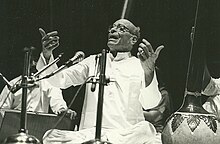Mallikarjun Mansur
| Mallikarjun Mansur | |
|---|---|
 |
|
| Background information | |
| Birth name | Mallikarjun Bheemrayappa Mansur |
| Also known as | Mallikarjun Manasoor |
| Born | 1 January 1911 |
| Origin | Mansur, Dharwad, Karnataka |
| Died | 12 September 1992 (aged 81) |
| Genres | Hindustani classical music Khayal |
| Occupation(s) | Vocalist |
| Years active | 1928(?) – 1992 |
| Labels | HMV, Music Today, Inreco |
Mallikarjun Bheemarayappa Mansur (Kannada: ಮಲ್ಲಿಕಾರ್ಜುನ ಮನಸೂರ) (1 January 1911 – 12 September 1992) was an Indian classical singer of the khyal style in the Jaipur-Atrauli gharana of Hindustani classical music.
He received all three national Padma Awards, the Padma Shri in 1970, Padma Bhushan in 1976, and Padma Vibhushan, the second highest civilian honour given Government of India in 1992. In 1982, he was awarded the Sangeet Natak Akademi Fellowship, the highest honour conferred by the Sangeet Natak Akademi, India's National Academy of Music, Dance & Drama.
Mansur was born on 1 January 1911, at Mansur, a village five km. west of Dharwad, Karnataka. His father, Bheemaraayappa was the village headman, a farmer by occupation and an ardent lover and patron of music. He had four brothers and three sisters. His elder brother Baswaraj owned a theatre troupe, and thus at age nine Mansur did a small role in a play.
Spotting the talent in his son, Mallikarjun's father engaged him to a travelling Yakshagana (Kannada theatre) troupe. The owner of this troupe took a liking to the tender and melodious voice of Mallikarjun and encouraged him to sing different types of compositions during the drama-performances. Hearing one such performance, he was picked up by Pandit Appaya Swamy under whom he had his initial training in Carnatic music. Sometime later, he was introduced to classical Hindustani music under Nilkanth Bua Alurmath of Miraj who belonged to the Gwalior Gharana. The latter brought him to Ustad Alladiya Khan (1855?- 1946), the stalwart and the then patriarch of the Jaipur-Atrauli gharana, in the late 1920s, who referred him to his elder son, Ustad Manji Khan. Following Manji Khan's untimely death, he came under the tutelage of Ustad Bhurji Khan, the younger son of Ustad Alladiya Khan. This grooming under Bhurji Khan, despite having 20 to 25 popular ragas only, had the most important influence on his style of singing.
...
Wikipedia
